
We kindly inform you that, as long as the subject affiliation of our 300.000+ articles is in progress, you might get unsufficient or no results on your third level or second level search. In this case, please broaden your search criteria.



Ukraine has started reforming its gas sector simultaneous with its struggle against Russian aggression and trying to prevent the construction of the Nord Stream 2 gas pipeline, which would deprive the country of most of its current gas transit revenues. However, further reforms are hampered by the lack of political will among Ukrainian authorities. The slow pace of the reforms and a dispute between the government and management of Naftohaz have negatively affected Ukraine’s international image. These factors could lead to a situation in which gas transit via Ukraine no longer is considered a viable alternative to the new Gazprom pipelines, which would seriously undermine Poland’s diplomatic efforts in support of Ukraine’s opposition to Nord Stream 2.
More...
Ukraina rozpoczęła reformę sektora gazowego, zmagając się z rosyjską agresją i próbując zapobiec budowie gazociągu Nord Stream 2, który pozbawi ją większości obecnych dochodów z tranzytu gazu. Jednak dalsze zmiany hamuje niewystarczająca wola polityczna ukraińskich władz. Wolne tempo reform i spór między rządem a kierownictwem Naftohazu negatywnie wpływają na międzynarodowy wizerunek Ukrainy. Czynniki te mogą sprawić, że tranzyt przez jej terytorium przestanie być uważany za wiarygodną alternatywę dla nowych gazociągów Gazpromu, oraz poważnie uderzą w dyplomatyczne wysiłki Polski, popierającej Ukrainę w sprawie Nord Stream 2.
More...
Wsparcie finansowe udzielane ze środków publicznych wpływa na wzrost konkurencyjności eksporterów i inwestorów. Dlatego finansowanie zagranicznej działalności rodzimego biznesu jest narzędziem rywalizacji państw na rynkach międzynarodowych. Aby wzmocnić szanse polskich firm na pozyskanie zagranicznych kontraktów, w systemie rządowego wsparcia należy zwiększyć nakłady finansowe, usprawnić już istniejące instrumenty, rozszerzyć ich rodzaje oraz spopularyzować je wśród przedsiębiorców.
More...
Culture can be a powerful marketing and branding tool for corporations and states alike. As Polish companies strengthen the Corporate Social Responsibility model while competing on global markets, they should also pay special attention to supporting culture. The stronger engagement of business in cultural diplomacy would bring extra resources and create a synergy between the efforts of the private and public sectors to build Poland as a positive brand. To facilitate this cooperation, the government can create new mechanisms and regulations that will attract greater business involvement in such promotion.
More...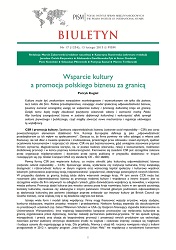
Kultura może być znakomitym narzędziem marketingowym i wizerunkowym nie tylko dla państw, lecz także dla firm. Polskie przedsiębiorstwa, rozwijając model społecznej odpowiedzialności biznesu, powinny zwracać szczególną uwagę na wspieranie kultury i promocję kulturalną kraju za granicą. Dzięki temu będą mogły zbudować pozytywny wizerunek własny i wzmocnić markę Polski. Aby bardziej zaangażować biznes w zadania dyplomacji kulturalnej i wykorzystać efekt synergii sektora prywatnego i publicznego, rząd mógłby stworzyć nowe mechanizmy i regulacje ułatwiające tę współpracę.
More...
The study presents the results of surveys conducted among entrepreneurs, teachers and students in December 2019 and aimed to measure investment in education to increase the skills and competencies required by the labor market, both students and teachers, the links between faculties and companies differences in perception and communication in the area.
More...
The study presents the results of focus groups conducted in December 2019 with students, professors of the Technical University „Gheorghe Asachi” in Iasi, but also with entrepreneurs working with them. He measured the satisfactions and dissatisfactions of each group compared to the other two, the needs of professionalism, collaboration, skills and competencies had and requested, entrepreneurial education, future prospects.
More...
The study presents in-depth interviews with decision makers from the Polytechnic University of Timisoara on the involvement of students in practice, research activities, their support for employment, the relationship with graduate faculties and prospects for the coming years. He points out that the professors went on vocational training courses at prestigious universities only during their doctoral period; that those in charge of the institution have only exceptionally graduated management courses; that students’ internships are different from those in Western universities (short-term, without a mentor to really guide them, with minimal, simplistic, unpaid activities, with little access to valuable information, with little use in their development professional); that the involvement of students in research activities is an exception; that the integration of graduates into the labor market is only formally monitored, without strengthening their subsequent relationship with the university; that the wave of emigration has stopped, followed by that of mobility, of work in several countries; that the Ministry of Education does not have a strategy for the insertion of graduates on the labor market.
More...
The research was conducted in May 2012 on a sample of 360 people who participated to the end in management training courses and business consulting activities. An additional 15 in-depth interviews were conducted. The study aimed to evaluate the activity of regional consultants of the National Foundation of Young Managers, the activity of the central team of experts and teachers, the usefulness of learned theories, advice and managerial advice received, the quality of teaching materials, relationships with other participants, changes among employers. involvement in the project. A monitoring of the appearances of the information about the Rural Entrepreneur project was carried out in the written and audiovisual press. The study also presents an evaluation from the perspective of the team of experts involved in coordinating the activities.
More...
Vest da je preduzeće Beograd na vodi i u prošloj godini zabeležilo gubitak u poslovanju dobila je ovih dana znatan medijski publicitet. Sasvim logično jer je podatak da je Beograd na vodi zajedno sa svoja dva namenski formirana preduzeća BW Kula i BW Galerija zabeležio gubitak u ukupnom iznosu od oko 18 miliona evra u zaista ogromnom raskoraku sa svakodnevnim vestima o tome da svoje nekretnine prodaju po rekordnim, ne samo za naše prilike, izuzetno visokim cenama.
More...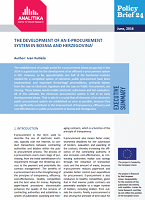
The establishment of a single portal for e-procurement (www.ejn.gov.ba) in late 2014 is a good basis for the development of an efficient e-procurement system in BiH. However, so far, approximately one half of the functional modules needed for a completed system of electronic public procurement have been implemented, and important formal-legal preconditions, primarily bylaws from the Law on Electronic Signature and the Law on Public Procurement, are missing. Those bylaws would enable electronic submission and bid evaluation. All of this indicates the electronic procurement system is still in an early developmental phase. That is why it is crucial that all elements of an electronic public procurement system are established as soon as possible, because they can significantly contribute to the improvement of transparency, efficiency and cost-effectiveness in public procurement in Bosnia and Herzegovina.
More...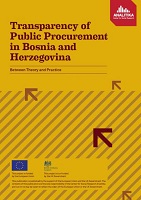
Transparency is often singled out as one of the key indicators of a just and functional public procurement system, and it refers to the availability of all relevant information that enables stakeholders to become familiar with the rules and procedures applied in the public procurement process. If a public authority fails to ensure a sufficient level of transparency, it is impossible to ascertain whether the public procurement procedure was conducted impartially and in line with the rules. In that context, transparency in the implementation of public procurement contributes to increasing the accountability of public authorities and more efficient control of public spending. Contracting authorities in Bosnia and Herzegovina (BiH) are under the obligation to transparently conduct public procurement procedures and ensure fair and equal treatment of all tenderers in order to achieve the best value for public money. These principles are stipulated in the Law on Public Procurement in Bosnia and Herzegovina (hereinafter: LPPBiH) adopted in April 2014 as part of the public procurement system reforms and harmonisation of domestic legislation with European Union acquis. The new, modernised legal framework was established in BiH ten years after the adoption of the first Law on Public Procurement in 2004, which had shown numerous shortcomings in practice, including some to do with transparency. Although the new law introduced better norms for the aspect of transparency in public procurement, shortcomings that may have significant implications in practice are still evident. One of the aims of this analysis is to assess the extent to which the legal framework ensures an adequate level of transparency in public procurement in BiH, and how transparency could be improved. The analysis offers insight into the main obstacles to transparency in public procurement, especially in light of international standards and comparative practices, focusing primarily on existing legal and institutional solutions in this domain. It should be noted that the new Law on Public Procurement of BiH has been in force only since November 2014, and that certain bylaws relevant to transparency have not yet been adopted. That is why at this stage of research, insight into the practice of public procurement is still limited. This report focuses on the obligations of public institutions stipulated under the Law on Public Procurement of BiH to independently publish key information on public procurement that will enable the public procurement procedure and provide public insight into the process for awarding contracts. Access to all public information in the possession of any institution in BiH, including specific information on public procurement, may also be requested in line with the laws on free access to information adopted at the state and entity level, but this aspect of transparency is not the subject of the present analysis. This report takes into account the main conceptual discussions of transparency in public procurement processes. It then gives an overview of international standards in this area, focusing on European Directives for conducting public procurement procedures, and on decisions of the European Court of Justice. It also presents comparative practices in transparent public procurement in European Union countries with innovative approaches to improving the public procurement system, such as Slovakia and Portugal. The legal frameworks and practices of Western Balkan countries that have in the past few years made innovations to their legal and institutional frameworks for public procurement as part of the European Union approximation process are subject to a separate analysis. This primarily pertains to the experiences of Croatia, Serbia and Slovenia. Past reports on these issues, as well as the old and new legislative and institutional framework are also analysed. Finally, interviews were conducted with representatives of key institutions, including the Public Procurement Agency (hereinafter: PPA) and the Procurement Review Body (hereinafter: PRB), as well as with representatives of the business community in BiH.
More...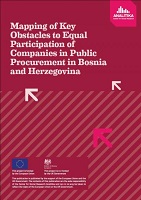
The public procurement system in Bosnia and Herzegovina (BiH) is characterised by numerous weaknesses and shortcomings. In the ten years of application of the BiH Law on Public Procurement, a range of irregularities in public procurement procedures have been identified, including practices of privileging individual bidders through discriminatory criteria and technical specifications in tender documentation, dividing procurement value into smaller amounts to avoid implementing the public procurement procedure for higher amounts, procurements of goods, services or works without a public procurement procedure, use of annexes to existing contracts to increase the value of procurement, and other ways of changing the terms of contracts based on public procurement procedures. Irregularities and abuses in public procurement have, among other things, contributed significantly to the spread of corruption and to hindering the operation of the private sector in BiH. Research has shown that corruption is one of the most significant obstacles to the work of private companies and to overall economic development, not just in BiH, but in countries of the region as well. Reports by international and non-governmental organisations and representatives of the business sector in BiH have for the past few years pointed out failings and irregularities in the public procurement system that undermine the basic principles of fair and active competition, transparency, equal treatment of bidders, and efficient and responsible public spending. This report resulted from the need to identify key problems in public procurement based on surveying a representative sample of the business community with direct experience of public procurement in BiH. The report is based on the findings of research conducted during 2014 with the main aim of mapping the major obstacles faced by companies in BiH entering public procurement procedures in BiH. Representatives of private enterprises of various sizes (micro, small, medium and large enterprises) and from various branches of the economy throughout BiH participated in the study. The study provides insight into the views and perceptions, as well as the reallife experience of business sector representatives in BiH when it comes to various aspects and phases of public procurement. In that context, this is the first survey study in BiH that identifies key problems in public procurement by relying on the views and experiences of business sector representatives that have participated in public procurement procedures. For the purposes of this report, which presents the main obstacles to the participation of enterprises in public procurement, the respondents answered questions about issues such as availability of public procurement invitations for submitting bids, definitions of eligibility criteria and technical specifications, application of appropriate procedures, transparency of outcomes, legal protection, public procurement contract implementation control, perception of the degree of corruption in public procurement, trust in the fairness and justice of public procurement procedures, etc. The examination of practices that hinder efficient market functioning and the identification of areas of heightened risk of corruption were also recognised in strategic documents of BiH authorities as a necessary measure for the development of efficient anti-corruption policies in BiH. The present study naturally fits into this normative and strategic framework. Namely, given that public procurement is particularly vulnerable to corruption, data from this report can prove useful as guidance for decision makers in BiH working to improve the public procurement regulatory framework and practices. The report first presents the main features of the public procurement system and gives details of the research methodology. Research results that reflect the experience of private sector representatives in public procurement in BiH are set out in the fourth chapter and divided among all the phases of the public procurement cycle. The conclusion sums up the key results and indicates further research and analyses necessary in this area.
More...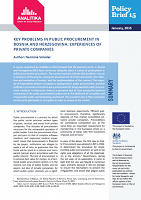
A survey conducted by Analitika in 2014 showed that the business sector in Bosnia and Herzegovina (BiH) faces numerous obstacles when it comes to participation in public procurement procedures. The survey responses indicate that problems crop up in all phases of the process: during the development of tender documents, the collection and evaluation of tenders, and the implementation of the contract. The majority of respondents believe corruption is widespread in public procurement, and that political or personal connections are a prerequisite for being awarded public procurement contracts. Furthermore, there is a pervasive lack of trust among the business community in the public procurement system and in the likelihood of corruption and irresponsible public spending being sanctioned. The prevalent view is that companies are forced to participate in corruption in order to survive in the market.
More...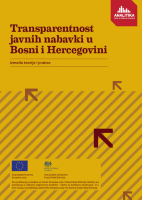
Transparentnost se često izdvaja kao jedan od ključnih pokazatelja pravednog i funkcionalnog sistema javnih nabavki, a podrazumijeva dostupnost svih relevantnih informacija koje omogućavaju zainteresiranim subjektima da budu upoznati sa pravilima i procedurama koje se primjenjuju u procesu javnih nabavki. Ukoliko javni organ ne osigura adekvatan nivo transparentnosti, nije moguće provjeriti da li je postupak javne nabavke proveden nepristrasno i u skladu sa procedurama. U tom kontekstu, transparentno provođenje javnih nabavki doprinosi većoj odgovornosti javnih organa i efikasnijoj kontroli trošenja javnih sredstava. Ugovorni organi u Bosni i Hercegovini (BiH) dužni su transparentno provoditi postupke javne nabavke, osigurati jednak i fer tretman svih ponuđača, a sve sa ciljem postizanja najbolje vrijednosti za javni novac. Ovi principi propisani su Zakonom o javnim nabavkama u Bosni i Hercegovini (u daljnjem tekstu: ZJNBiH), koji je usvojen u aprilu 2014. godine, kao dio reforme sistema javnih nabavki i usklađivanja domaćeg zakonodavstva sa legislativom Evropske unije. Novi, modernizirani zakonski okvir u BiH uspostavljen je deset godina nakon usvajanja prvog Zakona o javnim nabavkama iz 2004. godine, koji je u praksi pokazao brojne manjkavosti, između ostalog, i u domenu transparentnosti. Iako je novim zakonom bolje normiran aspekt transparentnosti u javnim nabavkama, i dalje su uočljivi nedostaci koji bi mogli imati značajne implikacije na praksu. U ovoj analizi upravo je jedan od ciljeva procijeniti u kojoj mjeri zakonski okvir osigurava adekvatan nivo transparentnosti u javnim nabavkama u BiH, te na koji bi se način transparentnost mogla unaprijediti. Analiza nudi uvid u glavne prepreke transparentnosti u oblasti javnih nabavki, posebno u svjetlu međunarodnih standarda i komparativnih praksi, prvenstveno se fokusirajući na postojeća zakonska i institucionalna rješenja u ovoj oblasti. Potrebno je napomenuti da se novi Zakon o javnim nabavkama BiH primjenjuje tek od novembra 2014. godine te određeni podzakonski akti relevantni za transparentnost još nisu doneseni. Iz tog je razloga uvid u praksu javnih nabavki ograničen u ovoj fazi istraživanja. Ovaj izvještaj stavlja fokus na obaveze javnih institucija da, u skladu sa Zakonom o javnim nabavkama BiH, samoinicijativno objavljuju ključne informacije o javnim nabavkama, koje omogućavaju provođenje postupka javnih nabavki, ali i uvid javnosti u proces dodjele ugovora. Također, pristup svim javnim informacijama u posjedu bilo koje institucije u BiH, uključujući i specifične informacije o javnim nabavkama, moguće je zahtijevati u skladu sa zakonima o slobodnom pristupu informacijama, koji su usvojeni na državnom i entitetskom nivou, no taj aspekt transparentnosti nije predmet ove analize. Za potrebe ovog izvještaja u obzir su uzete glavne rasprave konceptualne prirode kada je u pitanju transparentnost u procesima javnih nabavki. Potom je urađen pregled međunarodnih standarda u ovoj oblasti, sa fokusom na Direktive Evropske unije o provođenju postupaka javne nabavke, kao i na presude Evropskog suda pravde. Također, predstavljene su komparativne prakse u domenu transparentnih javnih nabavki u zemljama Evropske unije, koje imaju inovativne pristupe unapređenju sistema javnih nabavki, poput Slovačke i Portugala. Posebno su analizirani zakonski okviri i prakse zemalja regije zapadnog Balkana, koje su u posljednjih nekoliko godina inovirale svoj zakonski i institucionalni okvir u ovom domenu, kao dio procesa približavanja članstvu u Evropskoj uniji. Ovdje se prije svega misli na iskustva Hrvatske, Srbije i Slovenije. Analizirani su i dosadašnji izvještaji u ovoj oblasti, te stari i novi zakonski i institucionalni okvir. Konačno, urađeni su intervjui sa predstavnicima ključnih institucija, uključujući Agenciju za javne nabavke (u daljnjem tekstu: AJN) i Ured za razmatranje žalbi (u daljnjem tekstu: URŽ), kao i sa predstavnicima poslovne zajednice u BiH.
More...
31 March 2023 saw the publication of a joint letter by the prime ministers of Poland, Hungary, Romania and Slovakia, and the president of Bulgaria, to the President of the European Commission Ursula von der Leyen on the measures they intended to take to counteract the negative effects of the increased imports of agricultural products from Ukraine to the EU. The document highlights the unprecedented increases in imports of grain, oil seeds, fruit, dairy and honey. It also proposes measures to improve the situation of local agricultural producers, including increasing the financial support offered to them. The authors of the letter emphasise that if the market disruptions cannot be eliminated by other means, tariffs and tariff rate quotas will need to be re-introduced on imports from Ukraine (they were suspended in June 2022). On 7 April 2023, Warsaw and Kyiv reached an agreement on suspending the export of wheat, corn, sunflower seeds and rapeseed to Poland until the beginning of the new season (summer), while the transit of Ukrainian produce via Polish territory will be maintained.
More...
At the beginning of September 2022, Turkey’s President Recep Tayyip Erdoğan paid a visit to Bosnia and Herzegovina (BiH), Serbia and Croatia. The trip was the culmination of Turkish diplomatic activity towards the region in recent months. Earlier, in June 2022, Turkish Foreign Minister Mevlüt Çavuşoğlu visited Serbia, Croatia, BiH and Kosovo, in August 2022 he attempted to act as a mediator during the escalation of the Serbian-Kosovan conflict, and on 2 September2022 he attended the summit of the Serbian-led Open Balkan initiative held in Belgrade. These activities are consistent with Ankara’s policy that involves fostering its image as both an influential actor, and at the same time a neutral mediator in the Western Balkans – one that is able to contribute to a resolution of bilateral disputes and to the region’s stabilization. Turkey has pursued this policy for more than a decade. In addition, it has been consistently expanding economic influence in the Balkans, accompanied by the development of its retinue of soft power instruments based on shared religious and historical background. However, Turkey’s cooperation with the region’s states is also riddled with challenges. These include Ankara’s close collaboration with Moscow, which raises concern in some Balkan capitals; increasing tension in its relations with the EU and the US; as well as multi-faceted intra-regional disputes.
More...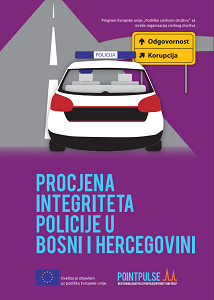
Pitanje integriteta policije u BiH je vrlo teško razmatrati usljed složenosti policijskog sistema. Sektor policije u BiH se sastoji od 16 policijskih agencija na svim nivoima vlasti i 6 institucija koje im pružaju podršku ili obavljaju slične aktivnosti. Ova činjenica otežava svako istraživanje, jer se svaka policijska agencija može smatrati kao pojedinačni subjekat, a istraživanje se može primjeniti posebno za svaku od njih. Općenito, rezultati ovog izveštaja ukazuju na to da niti pravni okvir, niti praksa ne obezbjeđuju osiguravanje integriteta policije. Osim toga, javnost ocjenjuje rad policije kao vrlo slab, a njihove napore u borbi protiv korupcije kao nedovoljne. Veliki uticaj političara na rad policije još uvijek postoji; transparentnost policije nije zadovoljavajuća kada je su pitanju istrage ozbiljnih slučajeva korupcije; upravljanje ljudskim resursima i finansiranje zahtijeva ozbiljne reforme kako bi bile funkcionalnije u borbi protiv korupcije; dok interne i eksterne kontrole zahtjevaju ozbiljne promjene kako bi bile nezavisne i funkcionalne. Ovaj izvještaj može da pomogne razmatranje integriteta policije sa važnih tački gledišta, uključujući pravni okvir i stavove građana. Takođe, izvještaj može da pomogne u sprovođenju sveobuhvatne studije i detaljnije analize svakog poglavlja.
More...